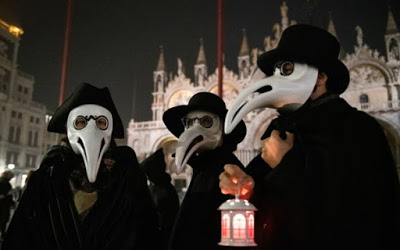A lesson coronavirus is about to teach the world
 |
| Jonathan Cook 20/03/2020 |
If a disease can teach wisdom beyond our understanding of how precarious and precious life is, the coronavirus has offered two lessons.
The first is that in a globalised world our lives are so intertwined that the idea of viewing ourselves as islands – whether as individuals, communities, nations, or a uniquely privileged species – should be understood as evidence of false consciousness. In truth, we were always bound together, part of a miraculous web of life on our planet and, beyond it, stardust in an unfathomably large and complex universe.
It is only an arrogance cultivated in us by those narcissists who have risen to power through their own destructive egotism that blinded us to the necessary mix of humility and awe we ought to feel as we watch a drop of rain on a leaf, or a baby struggle to crawl, or the night sky revealed in all its myriad glories away from city lights.
And now, as we start to enter periods of quarantine and self-isolation – as nations, communities and individuals – all that should be so much clearer. It has taken a virus to show us that only together are we at our strongest, most alive and most human.
In being stripped of what we need most by the threat of contagion, we are reminded of how much we have taken community for granted, abused it, hollowed it out. We are afraid because the services we need in times of collective difficulty and trauma have been turned into commodities that require payment, or treated as privileges to which access is now means-tested, rationed or is simply gone. That insecurity is at the root of the current urge to hoard.
When death stalks us it is not bankers we turn to, or corporate executives, or hedge fund managers. Nonetheless, those are the people our societies have best rewarded. They are the people who, if salaries are a measure of value, are the most prized.
But they are not the people we need, as individuals, as societies, as nations. Rather, it will be doctors, nurses, public health workers, care-givers and social workers who will be battling to save lives by risking their own.
During this health crisis we may indeed notice who and what is most important. But will we remember the sacrifice, their value after the virus is no longer headline news? Or will we go back to business as usual – until the next crisis – rewarding the arms manufacturers, the billionaire owners of the media, the fossil fuel company bosses, and the financial-services parasites feeding off other people’s money?
‘Take it on the chin’
The second lesson follows from the first. Despite everything we have been told for four decades or more, western capitalist societies are far from the most efficient ways of organising ourselves. That will be laid bare as the coronavirus crisis deepens.
We are still very much immersed in the ideological universe of Thatcherism and Reaganism, when we were told quite literally: “There is no such thing as society.” How will that political mantra stand the test of the coming weeks and months? How much can we survive as individuals, even in quarantine, rather than as part of communities that care for all of us?
Western leaders who champion neoliberalism, as they are required to do nowadays, have two choices to cope with coronavirus – and both will require a great deal of misdirection if we are not to see through their hypocrisy and deceptions.
Our leaders can let us “take it on the chin”, as the British prime minister Boris Johnson has phrased it. In practice, that will mean allowing what is effectively a cull of many of the poor and elderly – one that will relieve governments of the financial burden of underfunded pension schemes and welfare payments.
Such leaders will claim they are powerless to intervene or to ameliorate the crisis. Confronted with the contradictions inherent in their worldview, they will suddenly become fatalists, abandoning their belief in the efficacy and righteousness of the free market. They will say the virus was too contagious to contain, too robust for health services to cope, too lethal to save lives. They will evade all blame for the decades of health cuts and privatisations that made those services inefficient, inadequate, cumbersome and inflexible.


